by Vlad Ungureanu
Aug 2020
Consensus/Social Proof
People look up to those around them to inform their decision when they are uncertain with respect to a certain course of action to take. Cialdini defined social proof as people doing what they observe other people doing ("safety in numbers" concept). For instance, if a co-worker works late, their colleagues are more likely to do the same. If a particular restaurant is always full of people, people are likelier to give that establishment a try.
People are more likely to be influenced by this principle if they are unsure of themselves or if they have a higher need or tendency for affiliation and as such, they tend to prefer the opinions of their targeted groups (in order to display similarity and thus have higher chances of acceptance or membership). Social psychology is rife with experiments that illustrate this unavoidable, human phenomenon, but a classic one is this 1960s elevator experiment (basically, whatever the majority of people do in an elevator, an individual who joins the group will copy). For example, if the group looks to the back of the elevator, the individual will do the same, even if it seems unnatural or useless.
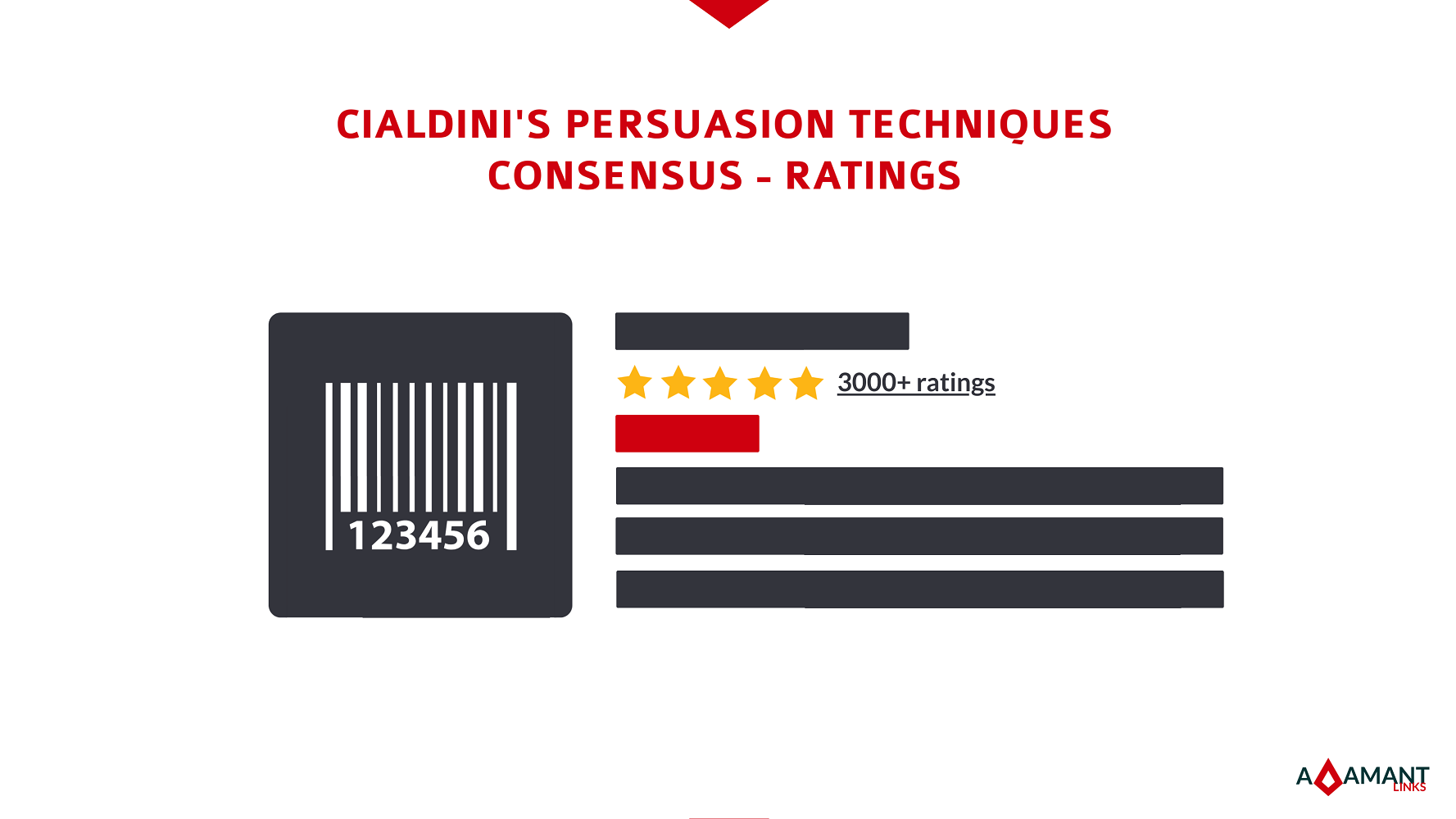
Adamant Links - Cialdini's Persuasion Techniques - Consensus: Ratings
Ratings are the best, and the most efficient implementation of this persuasion technique. Almost all e-commerce sites provide a rating system for the products they sell. Restaurants, bars, hotels and other service providers also have ratings on various applications (for example Yelp, TripAdvisor or Airbnb). Ratings provide increase security for a purchase. If a significant number of people have provided a reasonable high score then, the product or service must be good enough for other potential clients as well.
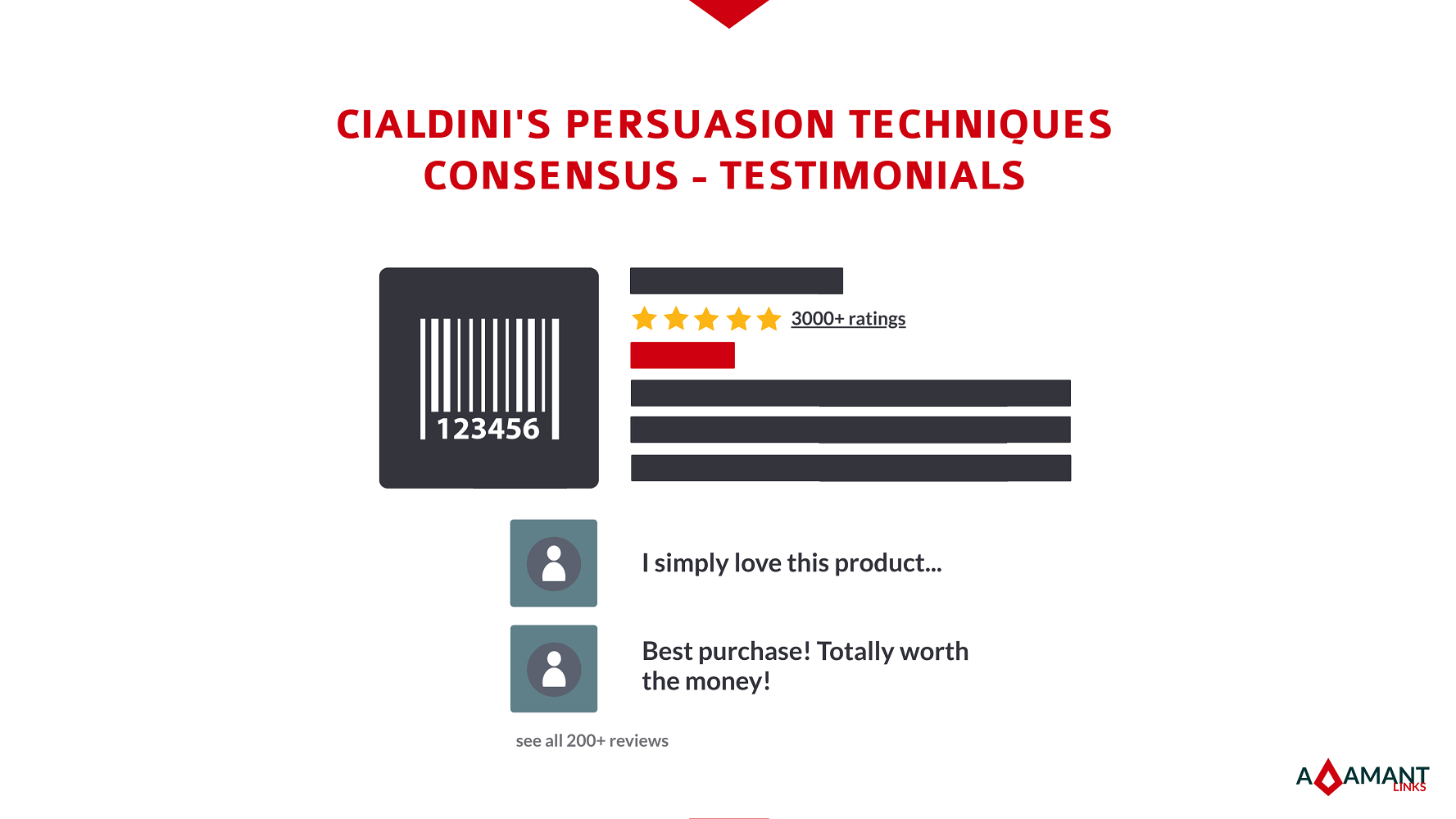
Adamant Links - Cialdini's Persuasion Techniques - Consensus: Testimonials
Have testimonials about the product or service is another great way to use "Social Consensus". Some personality types do not respond well to numbers, but can relate to other people experience. This is why aside from the rating system most sites provide a testimonial or review section where authenticated users (proving a higher degree of credibility) can describe their experience with the purchase.
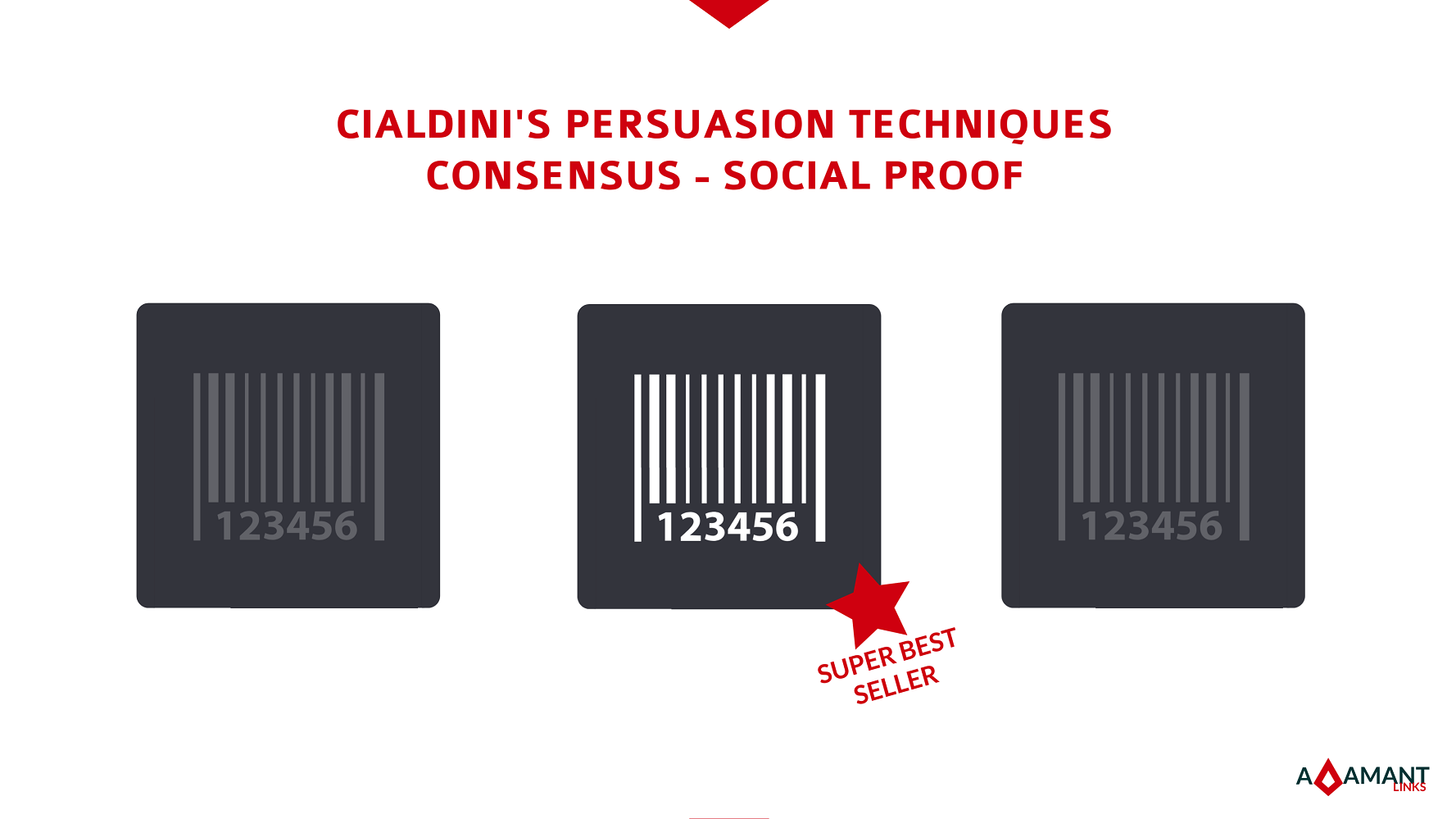
Adamant Links - Cialdini's Persuasion Techniques - Consensus: Social Proof
Social consensus can pe implied by tokens of proof. It is very common that sellers or service provides offer a high variety of options. It also very common to see various mentions about specific options like "best seller", "most popular" or "community favoured". In some cases, they might provide rankings based on popularity or quality badges suggesting some sort of elaborate vetting process that ensures better services and increased security.
Finally, an indirect implementation of the "Social Consensus" refers to recommendation systems. Most seller or service provider provide some recommendations presented as "people have also viewed", "other people are viewing", "other people have also bought" or even "bought together".
Out of the Big Five/OCEAN personality profiles, people high in Agreeableness or Neuroticism are more likely to respond to this persuasion technique. As previously discussed, Agreeable people are more compliant and value the opinions of others, sometimes even more than their own opinions. They have a moderate need for affiliation, but in some groups (family, close friends) this need is very high. As a result, they are more likely to take decision based on the social consensus of the groups they are part of. Agreeable people respond better to testimonials, where they can see the people that provided the testimonial and find similarities to themselves or people within their own social groups.
Neurotics favour "Social Consensus" as a result of their increased need for security and their tendency to fear being judged. If they make a purchase that is socially validated and widely accepted, it is very unlikely that they will be judged or criticized for making that specific decision. They also use this argument to decrease their feeling of anxiety when making the actual purchase as they defer the responsibility and risks to the group that provides the consensus.
Highly Conscientious people do not respond well to consensus. While they are also part of social groups and recognize the validity of ratings and consensus, they are sceptical by nature and prefer the ratings, reviews or testimonials to come from trusted sources. Another reason why people high in Conscientiousness do not respond well to this technique is the fact that they have difficulties relating to other people that are not Conscientious. For example, they might consider that something what works for people Open to Experience would never fit in a stable, ordered daily plan.
Liking
People are more likely to agree with or do things when asked by the people they like and that they believe like them back. "Liking" is based on sharing something similar or a more superficial interest, like physical attractiveness; or, if the other person compliments us.
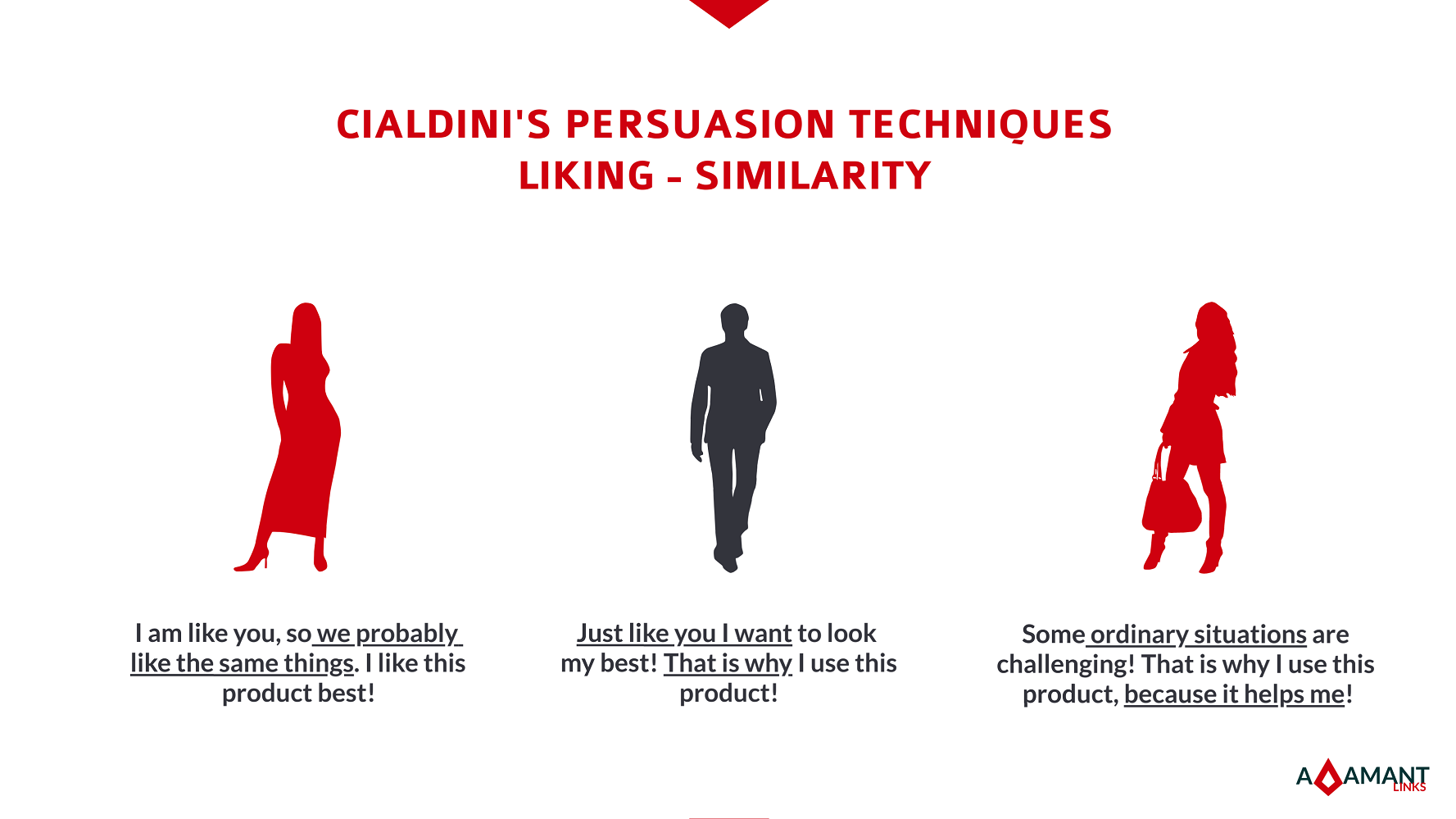
Adamant Links - Cialdini's Persuasion Techniques - Liking: Similarity
There are many ads and commercial in which very attractive people smile at us and then recommend a specific product, especially in the context of a very relatable situation. For example, most beauty or hygiene products present models that are getting ready for a "common activity" (going to work, going out, relaxing and so on) and "because, just like you, they want to look their best" they are using a specific product or brand. Another common way of using "Liking" is presenting a related person that compliments your choices or implies that your tastes, needs or desire are of a higher quality and thus make you better as a person. By creating this superficial connection, they suggest or recommend that a specific product or brand is aligned with your needs and desires and that by choosing that you confirm that you deserve the compliment or implied positive quality.
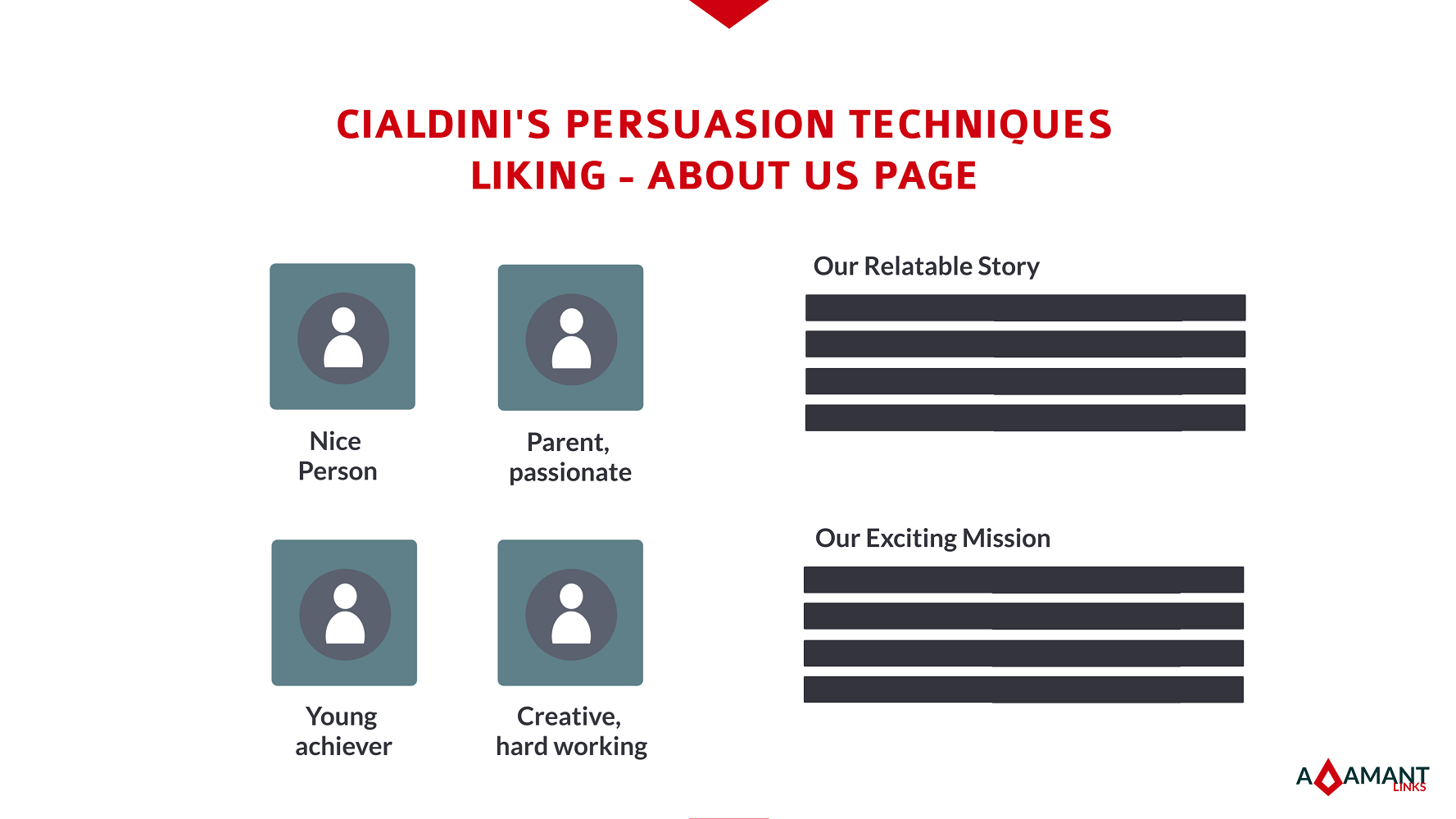
Adamant Links - Cialdini's Persuasion Techniques - Liking: About Us
Not all marketing strategies that use "Liking" are as shady as the previous case. A company that wants to boost conversion rates by using "Liking" can focus on creating and leading traffic to a great "About Us" page. A company’s "About Us" provides great opportunity to tell potential customers about the similarities between its staff and the site visitors. Since similarity is a key building block of liking, an effective "About Us" page is vital. Another approach used by companies is to showcase their employees. Instead of just referring to them as "the team" most companies now show pictures of their employees, share some data about them and provide a way to contact them individually in an effort to suggest similarities between the employees and potential buyers.
Out of the Big Five/OCEAN personality profiles, Agreeable people are more likely to respond to this persuasion technique. Agreeable people value the opinion of others and if someone is similar, likable and polite then they are more likely to be very persuasive.
Conscientious people are also defined by a strong "striving for achievement" trait and a result they literally like to be complimented and their qualities acknowledged, especially by someone who is similar, as it provides a form recognition of their perceived merits. However, similarity is not enough to drive purchase; at best it can act as a product discovery mechanism leading to a possible purchase sometime in the future.
Highly Extrovert or Open to Experience people do not respond well to "Liking". Extroverts prefer to be in the spotlight and rarely accept sharing the attention. As such, similarity is more often seen as a competition rather than a positive aspect. Striving for uniqueness does not fare well with similarity. However, if the person advertising a certain product is seen as having a higher social status, Extroverts might be inclined to consider a purchase in the hopes that it will confer an increase in their status as well. People Open to Experience prefer to experiment, explore and decide on their own. As such, even if the person recommending a product or service is similar and likable, they are less likely to be convincing.
References:
- "Investigation of the Influence of Personality Traits on Cialdini’s Persuasive Strategies", Kiemute Oyibo , Rita Orji and Julita Vassileva, 2017
- "Psychological targeting as an effective approach to digital mass persuasion", S. C. Matza, M. Kosinskib, G. Navec and D. J. Stillwelld, 2017
- "Investigating the Role of Personality Traits and Influence Strategies on the Persuasive Effect of Personalized Recommendations", Gkika Sofia, Skiada Marianna, Lekakos George and Kourouthanasis Panos, 2016
- "Personalized Persuasion: Tailoring Persuasive Appeals to Recipients’ Personality Traits", Jacob B. Hirsh, Sonia K. Kang, and Galen V. Bodenhausen, 2012
- "Big Five Personality Traits and Responses to Persuasive Appeals: Results from Voter Turnout Experiments", Alan S. Gerber, Gregory A. Huber, David Doherty, Conor M. Dowling, Costas Panagopoulos, 2012
- "The Impact of Individual Differences on Influence Strategies", N. Alkis and T.T. Temizel, 2015
In our next article, get a detailed look at psychographics and persuasion::
Psychographics and Persuasion - Part 3
-
Market Segmentation: Overview
FEB 2020 -
Market Segmentation: Demographics
MAR 2020 -
Market Segmentation: Geographic Location
MAR 2020 -
Big Five/OCEAN Personality Model
JUN 2020 -
Psychographic Segmentation
JUL 2020 -
Psychographics and Biological Gender
JUL 2020 -
Psychographics and Age
JUL 2020 -
Psychographics and Other Demographic Segments
JUL 2020 -
Psychographics and Individual Preferences
AUG 2020 -
Psychographics and Internal Values
AUG 2020 -
Psychographics and Shopping Motivation
AUG 2020 -
Psychographics and Social Media - Part I
AUG 2020 -
Psychographics and Social Media - Part II
SEP 2020 -
Psychographics and Persuasion - Part I
MAR 2021 -
Psychographics and Persuasion - Part II
APR 2021 -
Psychographics and Persuasion - Part III
APR 2021